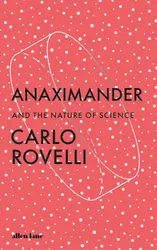Anaximander was a philosopher who lived between 610 and 546 BCE in the ancient Greek city of Miletus. This book makes the case that his contributions make Anaximander a significant figure in the development of scientific thinking, and explores his ideas in the context of the theory and practice of science.
The first part of the book describes the state of knowledge and the contributions made by Anaximander and his contemporaries. These include the idea that the Earth floats in space (previously it was assumed that ‘up’ and ‘down’ were universal concepts and therefore the earth had to be resting on something). He also came up with something that sounds quite similar to Darwin’s theory of evolution, in that he proposed that land animals evolved from sea creatures. And he had ideas about the water cycle i.e. the idea that rain comes from water that has evaporated from the ocean. Another intriguing idea was something called the Apeiron, which he suggested was the basis of all the phenomena that we see. It may be a stretch to conclude that this idea has been vindicated by what we now understand about atoms making up all matter in different forms. But the idea that there could be things we can’t directly see which, in different forms, make up all the phenomena we do see, is quite profound and a significant development in scientific thinking. Another profound idea of Anaximander’s was the idea that it’s possible to define laws for how natural phenomena evolve in time. This was essentially the basis for physics, such as Newton’s laws of motion, up until theories of relativity upended our understanding of time itself. But it still represents a good portion of science today in domains where we can treat time in this way.
One of the key ideas from around Anaximander’s time is that we don’t need gods and spirits to explain natural phenomena. So the book moves onto a discussion of the nature of science, especially when compared to religious thinking, and the cultural aspects of the changes that began around the time of Anaximander. Rovelli makes the case that another thing that made Anaximander significant was his willingness to find mistakes in the work of his predecessors. Previously, knowledge was considered to be absolute and eternal, but this idea of being able to improve on prior knowledge led to all our major scientific advances, including Einstein’s reformulation of Newton’s laws in his theories of special and general relativity.
This book is fairly short (especially when compared to Behave, the last book I read!) and easy to read. It doesn’t cover as many mind-bending topics as other books by Carlo Rovelli, such as Reality Is Not What It Seems, but I found it very enjoyable and I found the discussions engaging. I definitely came away from this book with an appreciation for a philosopher that I previously didn’t know much about.
